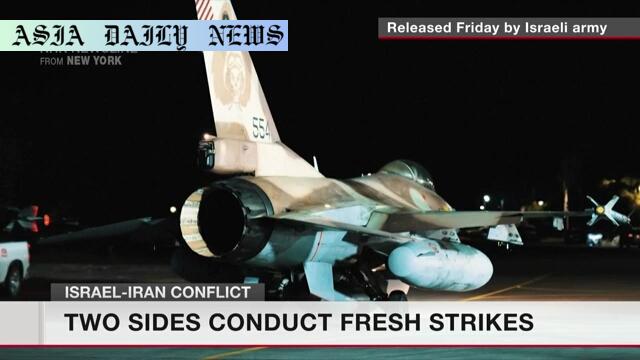Israel-Iran Conflict: Both nations ramp up attacks, with Israel targeting missile facilities and Iran responding with ballistic strikes.
Israel targets Iran’s missile facilities in fresh military strikes.
Iran retaliates with ballistic missiles, injuring 23 in Haifa.
Diplomatic efforts for de-escalation continue to falter.
Fordow uranium enrichment facility becomes a potential Israeli target.
Expert analysis highlights challenges of underground strikes in Iran.

Background: Understanding the Israel-Iran Tensions
The ongoing tensions between Israel and Iran are deeply rooted in ideological, territorial, and geopolitical disagreements. Recent events have further escalated the already volatile situation as both nations carry out targeted strikes. On Friday, the Israel Defense Forces (IDF) launched precision strikes on missile storage and launch facilities in western and northwestern Iran. The attacks were reportedly directed at neutralizing Iran’s military infrastructure, specifically those related to the Revolutionary Guard Corps and the Basij volunteer militia.
These operations reflect Israel’s longstanding objective of preventing Iran from acquiring advanced missile capabilities and nuclear weapons. Despite global leaders’ diplomatic outreach, efforts to mediate a resolution have thus far proven ineffective. The political and military complexities surrounding the region make de-escalation an increasingly challenging proposition.
Iran’s Escalatory Response
In response to the Israeli strikes, Iran’s Revolutionary Guard Corps launched retaliatory ballistic missile and drone strikes targeting Haifa, northern Israel. According to Iranian news agency Tasnim, the strikes injured 23 individuals, adding a human cost to the escalating violence. The Iranian public also took to the streets of Tehran following Friday prayers, displaying pictures of Supreme Leader Ayatollah Ali Khamenei and chanting slogans such as “Death to Israel.” The public demonstrations reflect deep-rooted animosity toward Israel and a unified display of national resolve.
The retaliatory actions by Iran highlight the growing risk of a broader regional conflict. Analysts have noted that these highly publicized assaults increase the chances of further escalation, making diplomatic efforts more urgent.
Fordow Facility: A Key Israeli Target
The Fordow uranium enrichment site in central Iran has emerged as a potential target for future Israeli military operations. The facility, buried deep underground, poses a significant challenge for conventional strikes. According to defense expert Steve Ganyard, demolishing the vast underground complex would likely require the deployment of advanced “bunker buster” bombs, possibly carried out by multiple B2 stealth bombers in a sustained campaign rather than a single strike.
The strategic importance of the Fordow site cannot be overstated. As one of Iran’s primary nuclear enrichment centers, its destruction would deal a severe blow to Tehran’s nuclear ambitions. However, the risks involved in such an operation are immense, not only in terms of the military logistics required but also the potential for unprecedented regional destabilization.
International Implications and Diplomatic Deadlock
World leaders continue to monitor the situation closely, with many expressing concern over the possibility of a full-scale war. While the United States has refrained from direct involvement, experts suggest that U.S. military assistance might become necessary if Israel decides to launch strikes on well-fortified Iranian facilities. NATO allies have also advocated for restraint, aiming to prevent the conflict from spilling over into neighboring regions.
Diplomatic channels remain open, with several nations urging immediate ceasefires. However, the lack of tangible progress highlights the entrenched positions of both Israel and Iran. Without significant compromises, the likelihood of a peaceful resolution appears increasingly remote.
The Human Cost and Path Forward
Beyond the strategic and political ramifications, the ongoing conflict has disastrous consequences for civilians on both sides. The strikes on Haifa underscore the immediate human toll of these military engagements. Similarly, communities near the targeted sites in Iran face the constant threat of violence and disruption.
Ultimately, resolving the Israel-Iran conflict requires addressing the underlying ideological and security concerns that fuel hostilities. A combination of diplomatic pressure, economic incentives, and international mediation may offer the best hope for de-escalation. However, until tangible steps are taken, the region remains at a precarious crossroads.
Commentary
The Complexity of the Israel-Iran Conflict
The Israel-Iran conflict is emblematic of the deeply interconnected nature of modern geopolitics, where ideological divisions, historical grievances, and strategic ambitions converge. The recent surge in hostilities represents more than just an exchange of military strikes; it underscores the broader struggle for regional dominance and global influence. Israel’s move to carry out targeted operations in Iran reflects its longstanding doctrine of preemptive action to counter perceived threats to its national security. However, these actions do not transpire in a vacuum. Iran’s swift retaliation highlights its resolve to portray strength and deter further aggression.
The Broader Implications for Regional Stability
The instability surrounding this conflict not only affects the immediate parties involved but also carries profound implications for the Middle East and beyond. As Iranian ballistic missiles strike Israeli cities, global powers are undoubtedly drawn closer to involvement. The possibility of the United States or NATO playing an active role in the event of significant escalation is high, given the strategic importance of Israel as a regional ally. Such involvement risks turning a bilateral conflict into a multi-nation confrontation, further destabilizing an already fragile region.
Hope Amid Uncertainty
Despite the gravity of the situation, hope for resolution persists. History demonstrates that even the most entrenched conflicts can find pathways to peace through dialogue and compromise. However, achieving such an outcome in the Israel-Iran conflict requires an unprecedented level of mutual understanding and willingness to engage in genuine negotiations. At the heart of the matter lies a need to reconcile national security imperatives with the overarching goal of regional and global peace.
As we watch these events unfold, it is imperative to advocate for diplomatic solutions as the cornerstone of any lasting settlement. From the corridors of power to the streets of affected cities, the voices urging peace must be amplified. Only then can the cycle of violence be broken, paving the way for a more stable and secure future.


